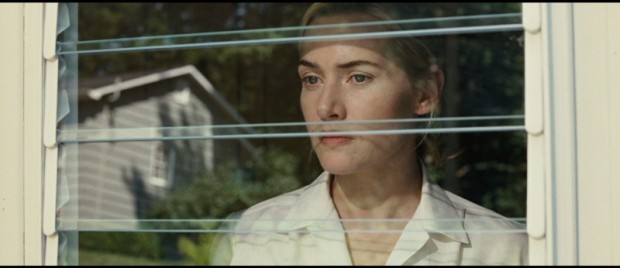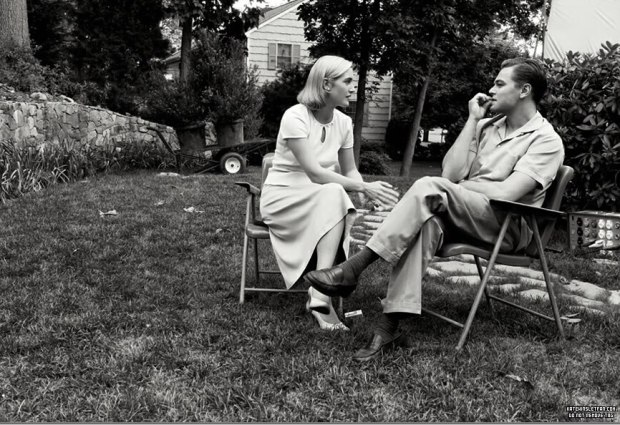This film is extraordinary. It completely floors me each time I see it. I think it may be the perfect film in terms of story, direction, acting, photography and costume. In my view, it is second to none. If you have never seen ‘Revolutionary Road’ – get a copy as soon as is humanly possible, sit down in a comfy armchair, close the curtains , pour yourself a very stiff drink (you’ll need it) and submit to this astonishing and deeply moving film about a marriage unravelling at the seams. At least, that is what the film appears to be about, at first glance. Dig deeper, however, and it becomes clear that the story is about far more than a failing relationship, it is multi-layered and encapsulates a number of themes.
I found this film uncomfortable to watch in places. The emotion in the scenes where April and Frank are warring with each other is very real; almost cruel in its’ veracity. The ending is tragic, and leaves many questions unanswered, suspended in the air for you to ponder over for some time afterwards. Watching this film was a raw experience for me, and I needed some time after the final scenes to think about and absorb what I’d seen, to reflect on it and come to some kind of conclusion as to what I thought and felt about it. The principle reason for my being so unsettled by ‘Revolutionary Road’ was more to do with the ever-present subtext, and the central theme of the story – the ‘hopeless emptiness’ of it all. This film is no picnic. If you’re emotionally squeamish, look away now, turn off the dvd player and watch the X-Factor instead.
So, why, may you ask, am I waxing lyrical about a film that is tantamount to being put through an emotional ringer for one hundred and twenty minutes of your life? Well, because, quite simply, it is sublime. It made me think, it made me feel, it touched me and most of all, it is truthful. Painfully so, but then, from what I’ve heard of Richard Yates’ books (from which this film was adapted), this is par for the course. Its’ relevance also struck a chord – though the story is set in mid-fifties suburban America, it could just as easily be set in 21st century suburban England or anywhere else you may care to mention. Its’ themes of repressed fifties suburban mentality, suppressed dreams and ambitions, and the complications of remaining an individual whilst in a relationship are universal.
The film starts with the initial meeting of Frank and April at a party. Boy meets girl, they enjoy each others company, have a few drinks and a few laughs, end up dancing, falling in love, sharing passions and dreams….and before they know it they are married, with two children, living in a respectable suburb in Connecticut. April keeps house, and Frank works a job in the city as a salesman. Their relationship is passionate and they are seen as a ‘special’ couple, somehow different from everyone else. To all intents and purposes, they have the perfect life; Frank has a steady job and is able to provide amply for his wife and family; they live in a comfortable home with all the modern conveniences that were typical in American (though not British) homes in the mid-1950s; they have two beautiful healthy children, friends, a social life. What could possibly be wrong with that?
The cracks start to show following the disastrous reception of the local amateur dramatic production in which April plays a part. It is a complete flop, leaving her devastated, staring with a dead expression at her reflection in the dressing room mirror, her long-hoped for dreams of becoming an actress in tatters around her. When she met Frank she had been an aspiring actress; now, several years on, two children later, her hopes and aspirations are merely shadows. The tumult that follows this scene is the first indication that all is not well in the Wheeler household and so begins the rapid decline of their marriage.
“We’re just like everybody else! We’ve bought into this ridiculous delusion, this idea that you have to resign from life and settle down as soon as you have children…”
When April has recovered sufficiently from her recent disappointment, she comes up with the idea that the family should up sticks and move to Paris, to follow their dreams of living an inspiring life, to give up the humdrum suburban existence they have fallen into. April will work as a secretary, Frank will have the space to think about what he wants to do with his life. She is rejuvenated by this plan, and comes alive again, seemingly awoken from a dazed slumber, now filled with vim and vigour. Frank initially resists, but April’s enthusiasm and passion convince him to embrace the idea and he submits to her will. There follows a brief spell in the film where all is rosy in the Wheeler garden – their relationship is invigorated by the shared plan to move to Paris and to start a new, more urbane and sophisticated life, filled with the promise of adventure. Unfortunately, the plan is threatened by a promotion at work for Frank, an unplanned pregnancy for April, and the creeping realisation in Frank that this is not what he wants. When Paris seems less and less of a probable reality, and more of a childish dream, the descent into tragedy begins. Through a number of revelations and failings on both their parts, Frank and April begin to tear each other to pieces until there is nothing left.
“It takes backbone to live the life you want.”
I don’t wish to say too much about the story for fear of ruining the plot for anyone who has not seen the film, so I have attempted not to reveal too much. Not a vast amount happens in terms of action or suspense, but yet there is so much going on, under the surface. A great deal is conveyed through the characters’ expressions and what is not said, just as much as the more explosive scenes where too much is said and the most awful revelations are made. The film is superbly acted, most notably by the two leads; but the supporting cast of characters are also instrumental in revealing more about Frank, April and their relationship than at times their own words or actions are able to.
Being somewhat of an admirer of Kate Winslet, I knew that I would love this film. Having been born in the same town (and in the same year) as her, I have always felt some strange (and yes, tenuous!) affinity with her. Beyond that somewhat incidental point, I admire the projects that she chooses, always a little left field, and with the exception of a couple of shockers (ahem, ‘The Holiday’) her films show off her acting skills to the best possible advantage. She plays strong women with a voice, with real heart and soul, with imperfections, and she does not bow to the pressure to play standard ‘wife’ or ‘girlfriend’ roles. Her realisation of April Wheeler is nothing short of brilliant. Her Oscar for ‘The Reader’ was clearly deserved, and I enjoyed that film, but I thought that her performance in ‘Revolutionary Road’ was more skilful and required a much wider range to flesh out the character of April and to make her so frighteningly real. Leonardo DiCaprio, is in my view, the best actor of my generation, and he was perfect for the role of Frank Wheeler. However, for me, it is Katherine Hahn’s performance as Milly, that really made me sit up and take notice, and also Michael Shannon as the mentally ill John Givings, who has probably the sanest voice in the film and is the only character who manages to be true to himself and to speak the truth, though at great cost. The cinematography is utterly breathtaking – Roger Deakins is a genius and though I couldn’t give a monkey’s about awards and suchlike, I still think it’s criminal that the man has not received a golden statuette for his work to date. Another star of this film is Thomas Newman’s gorgeous score, which just adds to the claustrophobic atmosphere created by the characters and their circumstances.
I really don’t think there is anything I dislike about this film – it is brave, truthful, beautiful to look at, perfectly casted, thoughtfully directed and a film I will come back to again and again. I love a good period drama, which is essentially what this is. The attention to period detail is astounding, and the use of costume brilliantly reflects the different stages of the characters within the film – particularly April. What I also love about ‘Revolutionary Road’ is that the characters are so real, in the sense that like real people, Frank and April are neither ‘bad’ nor ‘good’. Neither one is blameless in the breakdown of their relationship, and they both contributed equally to its’ demise. There is no one person to point the finger at or to demonise. I realise, looking at other reviews of this film, that April is seen as selfish and consumed by her own wants and desires, and whilst I agree with all of these things, I also see in April the need for a release from the trap she has found herself in. Her passion and enthusiasm are infectious, even if they are the products of delusion. To be honest, there were plenty of moments throughout the film when I would have given either of them a good slap!The ending, whilst desperately sad and bewildering, is the perfect end to the film as it raises questions that are not answered, thus leaving you to do the work and to interpret the ending as you will. The final scene encapsulates the tone of the film and even raised a knowing smile on my face.
I love that this film prompted such a strong reaction in me, and I cannot recommend it enough. To be watched, as I mentioned earlier, with a stiff drink (no ice, you need to drink it neat) and with plenty of time afterwards to have a good think!

